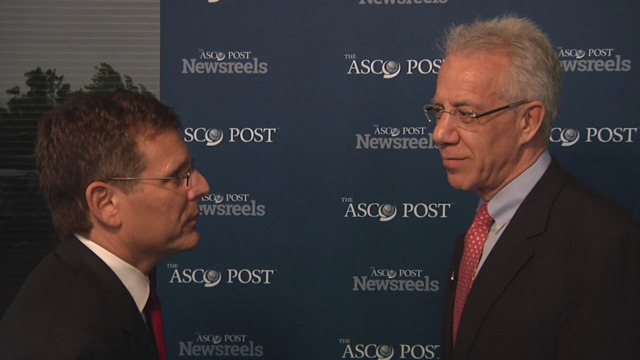Richard G. Margolese, MD, Summarizes NSABP B-35 Trial Results for Postmenopausal Women With DCIS
2015 ASCO Annual Meeting
Richard G. Margolese, MD, of McGill University discusses the improvement in breast cancer-free interval with anastrozole vs tamoxifen in patients with DCIS undergoing lumpectomy plus radiotherapy (Abstract LBA500).
Related Videos
Lawrence N. Shulman, MD and Clifford A. Hudis, MD
Lawrence N. Shulman, MD, of Dana-Farber Cancer Institute, and Clifford A. Hudis, MD, of Memorial Sloan Kettering Cancer Center, discuss the delivery of cancer care in resource-constrained settings such as Rwanda and Haiti, and plans to conduct research in basic tumor biology of patients in these areas.
David E. Gerber, MD, and James L. Mulshine, MD
James L. Mulshine, MD, of Rush University Medical Center, and David E. Gerber, MD, of The University of Texas Southwestern Medical Center, discuss the ALCHEMIST trial, an NCI initiative to address the role of molecular testing and targeted therapies for earlier-stage lung disease (Abstract TPS7583).
Daniel A. Vorobiof, MD, and Bernardo Leon Rapoport, MD
Daniel A. Vorobiof, MD, of the Sandton Oncology Centre, and Bernardo Leon Rapoport, MD, of The Medical Oncology Centre of Rosebank, discuss the first study to evaluate the efficacy and safety of a single dose of intravenous fosaprepitant. The use of this NK1 inhibitor and another (rolapitant) in a second study discussed may change the management of chemotherapy-induced nausea and vomiting and improve quality of life for patients (Abstracts 9629 and 9615).
Dung T. Le, MD, and Axel Grothey, MD
Dung T. Le, MD, of Sidney Kimmel Comprehensive Cancer Center at Johns Hopkins University, and Axel Grothey, MD, of the Mayo Clinic, discuss how mismatch repair status predicts clinical benefit of immune checkpoint blockade with pembrolizumab (Abstract LBA100).
Jame Abraham, MD
Jame Abraham, MD, of the Cleveland Clinic discusses analyses of two trials for locally advanced, inflammatory, or early HER2-positive breast cancer using docetaxel, trastuzumab, pertuzumab, and neratinib (Abstracts 505 and 508).





